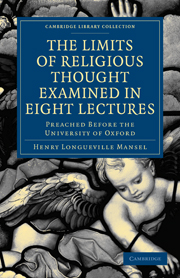 The Limits of Religious Thought Examined in Eight Lectures
The Limits of Religious Thought Examined in Eight Lectures Book contents
TESTIMONIES OF THEOLOGIANS
Published online by Cambridge University Press: 29 August 2010
Summary
PRINCIPAL DOCTRINE MAINTAINED IN THESE LECTURES, IN ONE OF THE FOLLOWING FORMS:
That the Absolute Nature of God is unknown to man.
That conceptions derived from human consciousness do not represent the Absolute Nature of God.
That God is revealed in Scripture by means of relative conceptions, accommodated to man's faculties.
I. Clement of Alexandria.—Strom., ii. 16, p. 168, Sylb.: “The Divine Nature cannot be described as it really is. The Prophets have spoken to us, fettered as we are by the flesh, according to our ability to receive their saying, the Lord accommodating Himself to human weakness for our salvation” [Translated by Bishop Kaye, Clem. Alex., p. 141]. Strom, v. 12, p. 251. “The first principle of all things cannot be named. And if we give it a name, not properly (οủ κυρίως), calling it either One, or the Good, or Intellect, or the Very Existent, or Father, or God, or Maker, or Lord, we speak not as declaring its name, but by reason of our deficiency we employ good names, in order that the reason may be able to rest upon these, not wandering around others. For these names are not severally indicative of God, but all collectively exhibit the power of the Almighty: for the names of things are given to them either from the properties belonging to them, or from their relation to each other: but none of these can be received concerning God.”
- Type
- Chapter
- Information
- The Limits of Religious Thought Examined in Eight LecturesPreached before the University of Oxford, in the Year M.DCCC.LVIII on the Foundation of the Late Rev. John Bampton, pp. xx - xlivPublisher: Cambridge University PressPrint publication year: 2009First published in: 1867


